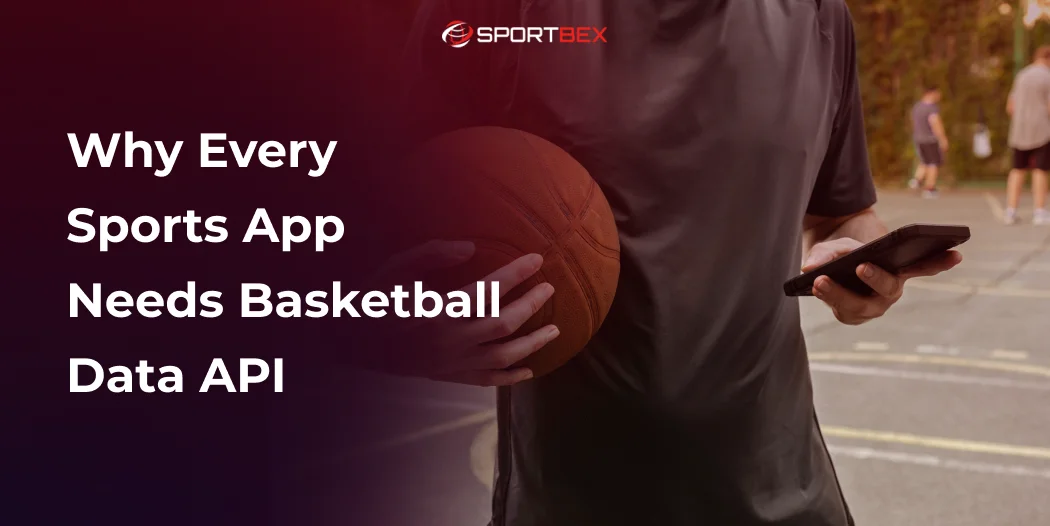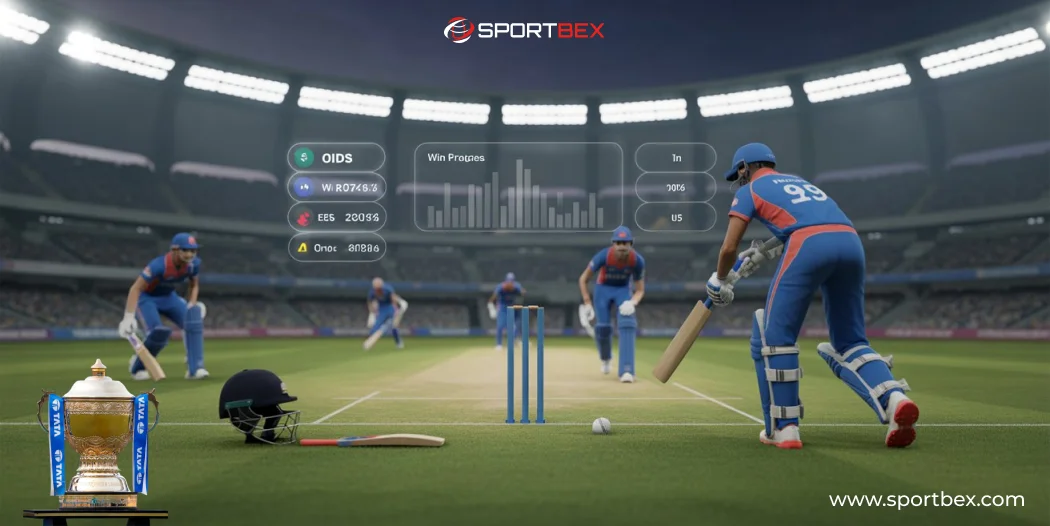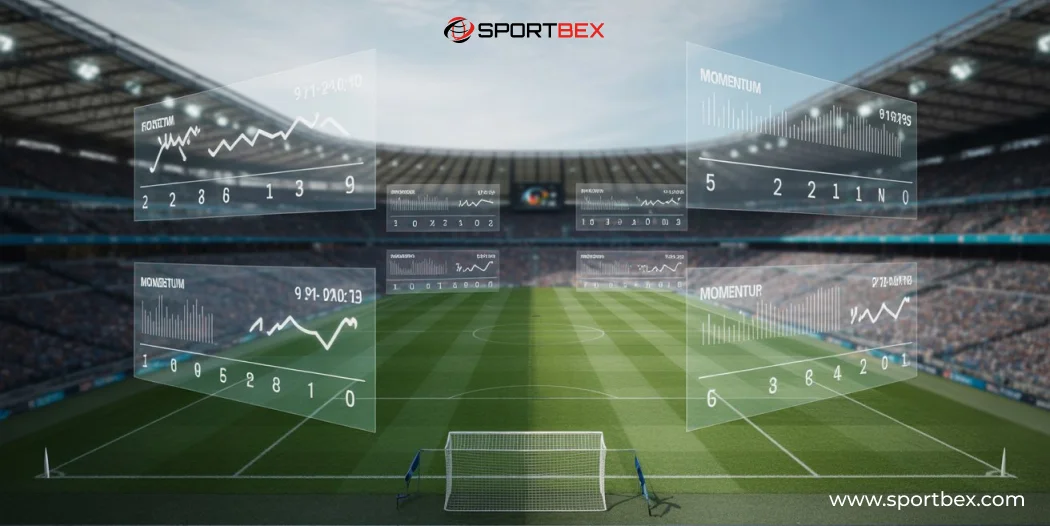The roar of the crowd, the squeak of sneakers on polished wood, and the thrill of a last-second shot make basketball a game defined by unforgettable moments. For millions of fans, the excitement continues off the court, fueled by instant scores, detailed player analytics, and real-time basketball updates on mobile devices.
If you are developing a sports app, integrating a basketball API ensures you deliver accurate, dynamic data, keeping users engaged and connected to every play. Missing out on real-time basketball data for apps is not just a loss; it is a competitive disadvantage.
We will explore what these APIs are, the immense value they provide, and how they can be leveraged to create engaging, feature-rich applications that capture and retain a loyal user base.
From live scores to intricate player stats and fantasy league management, this post explains why every sports app needs a basketball data API and how the right data feed can transform an app from a simple scoreboard into an indispensable tool for every basketball fan. Whether building a dedicated basketball stats app or a comprehensive platform for sports enthusiasts, these insights will help create a winning product.
What is a Basketball Data API?
A Basketball Data API (Application Programming Interface) is a service that provides developers with structured, machine-readable basketball data. Think of it as a bridge connecting your application to a massive, constantly updated database of basketball information.
This data can include everything from live, play-by-play updates during a game to historical statistics spanning decades. The API handles the complex and resource-intensive work of data sourcing and management, allowing developers to focus on what they do best: building a great user experience.
By integrating a Basketball API, you can effortlessly populate your app with accurate and timely information, ensuring your users always have the latest details at their fingertips.
Why Sports Apps Need a Basketball Data API
In a crowded marketplace, a generic sports app simply won’t cut it. Users expect a sophisticated, immersive experience that feeds their passion for the game.
Accuracy and Reliability
Data integrity is paramount. Fans are unforgiving when it comes to incorrect scores, outdated standings, or flawed player statistics. A reputable API provider invests heavily in reliable data sources and rigorous verification processes to ensure the information sent to your app is accurate. This builds trust with your users and establishes your application as a credible source of basketball information.
Real-Time Data Delivery
Basketball is a fast-paced sport, and fans demand updates as they happen. A key function of a Basketball Data API is delivering live data with minimal latency. This includes real-time score changes, play-by-play events, and instant statistical updates for players and teams. This capability is essential for creating an engaging live-game experience that keeps users glued to your app.
Comprehensive Data Coverage
The modern fan wants more than just the final score. They want to dive deep into player performance, compare team statistics, and analyze historical trends. A robust API provides extensive data coverage, including detailed player stats (points, rebounds, assists, etc.), team rankings, historical data, and information on various leagues and competitions worldwide. This depth of content enriches your app and caters to both casual fans and hardcore statisticians.
Best Use Cases of Basketball Data API in Sports Apps
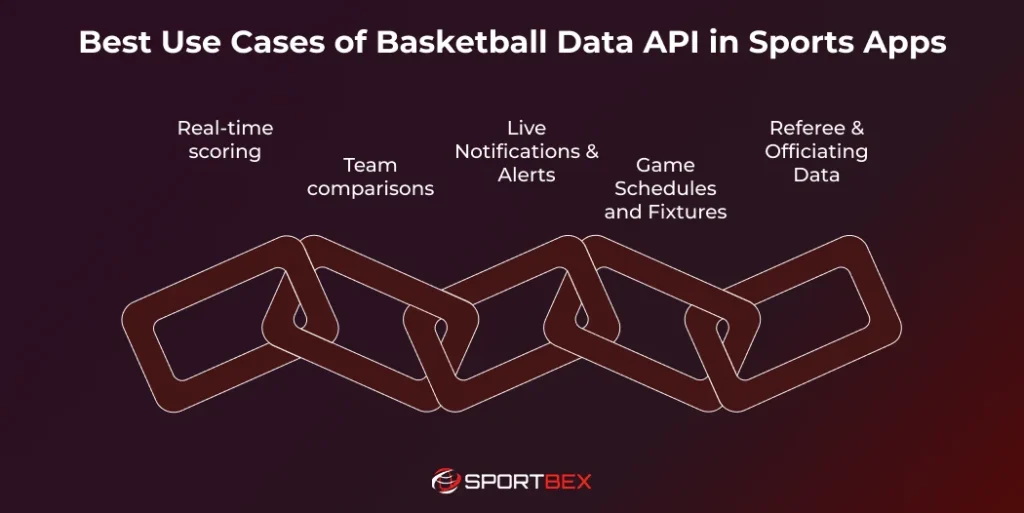
The true power of a Basketball Data API lies in how you use it to create compelling features. Here are some of the most effective use cases for transforming your basketball sports app into a must-have for fans.
Real-Time Scoring
A Basketball Score API allows you to display real-time scores, quarter-by-quarter breakdowns, and game clocks. By integrating a fantasy basketball API, you can also provide player stats and projections, enabling users to make informed decisions for their fantasy teams.
This lets you create a dynamic live-game interface that updates automatically, giving users an experience that rivals watching the game on TV.
Team and Player Comparisons
Basketball is a game of matchups. Fans love to debate which player is better or how two teams stack up against each other. An API provides the detailed statistics needed to build powerful comparison tools. Users can compare players head-to-head on metrics like points per game, assists, rebounds, and efficiency ratings.
For example, implementing advanced metrics like the Player Efficiency Rating can offer deeper insights and keep users engaged as they analyze player performance. You can also allow users to compare team stats, such as offensive and defensive ratings, to predict game outcomes.
Live Notifications & Alerts
Push notifications are a powerful tool for re-engaging users. With a Basketball Data API, you can set up automated alerts for key game events. Users could subscribe to notifications for:
- Game start and end times
- Score updates at the end of each quarter
- Close game alerts in the final minutes
- When a favorite player achieves a milestone (e.g., a triple-double)
These timely alerts bring users back into your app and make them feel connected to the action, even when they can’t watch the game live.
Live Basketball Data, Straight from the Court
A simple, reliable API to power your platform with global basketball data
Game Schedules and Fixtures
Help users plan their viewing schedule by providing comprehensive and up-to-date fixture lists. An API can deliver schedules for entire seasons across multiple leagues. You can display dates, times, venues, and broadcast information for upcoming games.
Adding features like calendar integration or setting reminders for specific games adds another layer of utility and convenience for your users.
Referee & Officiating Data
For the truly dedicated fan, even officiating data can be a point of interest. Some advanced APIs provide information on the referees assigned to a game and their historical stats, such as the average number of fouls called per game.
While a niche feature, it adds a layer of depth that can set your app apart and cater to the most analytical users who want to understand every facet of the game.
Key Features in a Basketball Data API
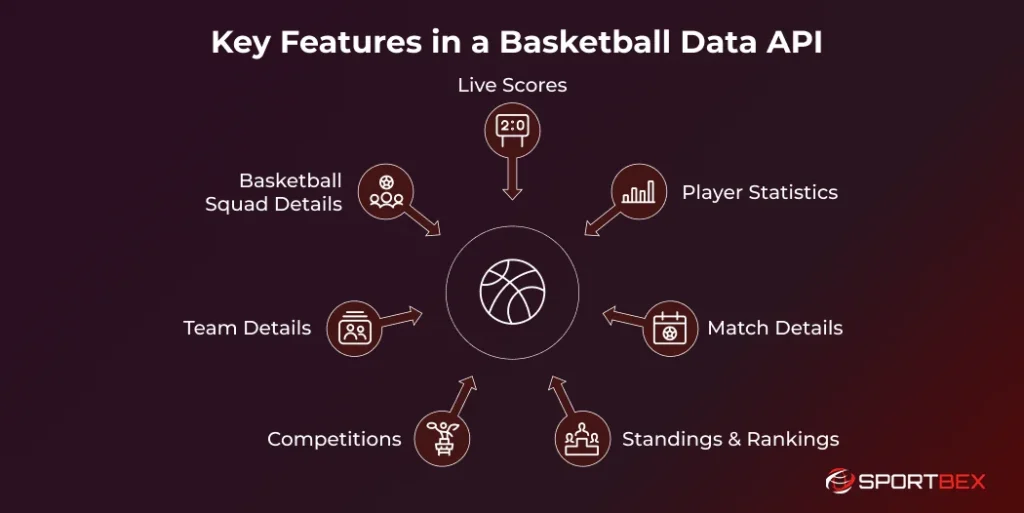
When evaluating different API providers, it’s essential to understand the key data points and features they offer. A comprehensive provider will deliver a wide range of information that allows you to build a feature-rich application.
Live Scores
This is the cornerstone of any sports data API. Look for a provider that offers low-latency, real-time updates on game scores, including points per quarter and overtime periods.
Player Statistics
Detailed player stats are crucial for fantasy sports and in-depth analysis. The API should provide both in-game (live) and post-game statistics, such as:
- Turnovers, Personal Fouls
- Points, Rebounds, Assists, Steals, Blocks
- Field Goals Made/Attempted (FGM/FGA), 3-Pointers Made/Attempted (3 PM/3PA)
Match Details
Beyond the score, users want context. The API should offer detailed match information, including:
- Information on injuries and player status
- Date, Time, and Venue
- Play-by-play event logs
Standings & Rankings
Users need to see the bigger picture. The API should provide up-to-date league standings and team rankings, including wins, losses, and conference/division positions. This helps users track their favorite team’s progress throughout the season.
Competitions
A quality API will cover a wide array of basketball leagues and tournaments from around the world. This could include major leagues like the NBA, EuroLeague, and FIBA competitions, as well as smaller national leagues. This global coverage allows you to cater to a diverse international audience. Many of the best fantasy sports apps succeed by offering a wide variety of leagues for their users to participate in.
Team Details
Provide users with a dedicated page for each team. The API should supply team-specific information like rosters, team statistics (average points per game, defensive efficiency), and historical performance data.
Basketball Squad Details
For fantasy basketball players and dedicated fans, knowing the current squad is crucial. The API should provide up-to-date rosters for each team, including player positions, jersey numbers, and injury status. This is one of the most critical fantasy sports app features.
How to Choose the Right Basketball Data API Provider
Selecting the right API provider is a critical decision that will impact your app’s performance, reliability, and potential for growth. When choosing the basketball API, consider the following factors:
- Data Accuracy and Source: Where does the provider get its data? Reputable providers have official partnerships or use multiple reliable sources to ensure accuracy.
- Documentation Quality: Clear, comprehensive, and easy-to-follow documentation is essential for a smooth integration process. A good sports API for developers will offer detailed guides, code samples, and a responsive support team.
- Latency and Reliability: How fast is the data delivered? For live scores, low latency is non-negotiable. Check the provider’s uptime guarantees and performance metrics.
- Coverage: Does the API cover all the leagues and competitions your target audience cares about? Consider both current and future needs. A good fantasy basketball API, for instance, would need to cover all major international and domestic leagues.
- Pricing and Scalability: API providers offer various pricing models, often based on the number of API calls or data usage. Choose a plan that fits your current budget but can also scale as your user base grows.
- Support: What level of technical support does the provider offer? Having access to responsive and knowledgeable support can be invaluable, especially during initial setup or if issues arise.
Conclusion
A Basketball Data API is the foundational technology that enables you to meet and exceed user expectations. By delivering accurate, real-time data, you can build an engaging and indispensable application that keeps fans coming back for more. From live scores that capture the thrill of the game to deep analytics that satisfy the most dedicated statisticians, the right data feed is the key to unlocking your app’s full potential.
This approach not only enhances your product but also opens up new avenues for growth, such as implementing premium features or exploring strategies for monetizing a basketball mobile app. By making the smart investment in a quality data provider, you are laying the groundwork for a scalable, reliable, and successful sports application that can win the loyalty of fans everywhere.
Ultimately, the goal is to create more than just an app; it’s to build a community and a go-to resource for basketball enthusiasts. Integrating a robust API allows you to focus on creating a unique user experience, fostering engagement, and exploring innovative features.
Build a Winning Sports Platform
Use our flexible Basketball API for your website, platform, or service.
Frequently Asked Questions
A Basketball Data API is a tool that provides real-time basketball scores, player stats, game schedules, and historical data. It allows developers to integrate live basketball information into apps, websites, and analytics platforms.
You can use a Basketball Data API to display live scores, player performance metrics, team statistics, and fantasy basketball projections. It enhances user engagement by providing real-time updates directly within your app.
A Basketball Data API typically provides live scores, player and team stats, game schedules, play-by-play data, standings, and historical performance metrics. Some APIs also include fantasy basketball stats and advanced analytics.
Integrating a Basketball Data API ensures your app or website offers accurate, real-time data, enhancing user experience. It helps retain users, supports fantasy leagues, and provides insights for analysis and predictions.
Yes. Developers can integrate APIs directly into apps or dashboards, while non-technical users can leverage tools built on the API to access live scores, statistics, and analytics without coding.
Recent Blog
What Are IPL Cricket Betting and How Do They Work?
February 2, 2026
 11 min
11 min
How Sportsbooks Use Real-Time Data Through a Football Betting Odds API
February 2, 2026
 7 min
7 min


